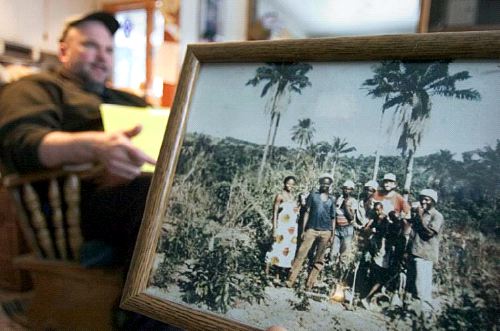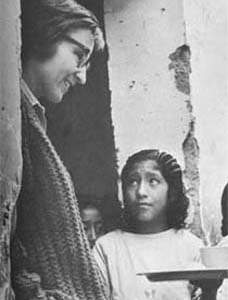
After more than 10 years of separation, Sierra Leone RPCV Mark Stopha had been wondering whether his African friend Solomon Saidu was still alive
Through war, upheaval, Red Cross traces a friend
Friends in far places
By I-CHUN CHE
JUNEAU EMPIRE
Caption: One of Mark Stopha's keepsake pictures shows Stopha and the family he stayed with for two years in Sierra Leone while he worked in the Peace Corps. Photo: Michael Penn / Juneau Empire
For more than 10 years of separation, Juneau resident Mark Stopha had been wondering whether his African friend Solomon Saidu was still alive. What separated them was more than half a globe.
The last time Stopha heard from Saidu was in 1994, the third year of an 11-year civil war in Sierra Leone that killed tens of thousands of people and displaced more than 2 million.
But last December, Stopha got a phone call from the American Red Cross of Alaska office in Anchorage, telling him that Saidu is alive and had just returned to Sierra Leone after staying in a refugee camp in Guinea for five years.
"I didn't know if they were going to tell me that he died or that he had come to the United States," said Stopha, 41. "I was really happy to know that he was alive. They read his letter to me on the phone so I didn't have to wait."
After a bloody war disrupted their correspondence, the two friends finally reached each other, thanks to the American Red Cross' international tracing and messaging services.
With its presence in 181 nations, the American Red Cross is able to connect people who have been separated as a result of disaster or conflict, and who have essential information about the missing person, and have exhausted all other channels to contact their relative or friend.
"All the requests share the central theme of loss," said Kristine Harder, financial development manager for the American Red Cross of Alaska office in Juneau.
The services are usually conducted between people living in the United States and relatives living in foreign countries.
From July 1, 2003, until June 30, 2004, the American Red Cross handled 913 new requests and was able to locate 415 of the people, according to the nonprofit organization's Web site.
Nancy Barros, the American Red Cross of Alaska's lead person in international services, said tracing a person is like the work of a private investigator.
"We always start with a phone book," Barros said. "Then we check marriage certificates and birth records. Or we will go to a specific culture and talk to people there randomly."
The inquiries may take several years.
Stopha's case was resolved faster. Saidu sent his request from Africa in September. The letter was then transferred to Switzerland and eventually arrived in Anchorage in December.
"He just said that he arrived in Sierra Leone safely after five years in Guinea," Stopha said. "His tone is calm. I think they feel lucky and happy to be alive."
Stopha knew Saidu when he served as an inland fisheries officer for the Peace Corps from 1986 to 1988. He taught rural farmers to build fish ponds and raise tilipia, an African fish that is easy to raise in a pond.
Saidu was Stopha's host.
"Solomon was like a big brother," Stopha said. "He helped me do my work, fed me and took care of me."
Stopha said the fish pond was a success, but he was frustrated at first when the farmers gave away their fish.
"I didn't realize until later that it was money in the bank for them," Stopha said. "Their life still functioned around the village. When someone accepted your fish, they helped you harvest rice in return. That was how they worked."
Stopha left before the war broke out.
After he returned to the United States, Stopha tried to keep in touch with Saidu and his brother Francis but correspondence wasn't always easy.
"After the war broke out, they sent me letters and I sent them letters, but they didn't get mine and I didn't get theirs," Stopha said. "In 2001, I got a letter from Francis. He wrote about himself and his family but he didn't mention Solomon. I wasn't sure if Solomon had died or gone to some other camp."
Last December, Saidu's letter answered Stopha's questions.
Saidu said the rebels torched his village, and the family crossed the border to stay in a refugee camp in Guinea. They finally returned to Sierra Leone last fall.
Since Stopha resumed contact with Saidu, Stopha has been planning to visit.
"I have wanted to go there several times just to visit them. But every time I was at a position to go, wars broke out," Stopha said. "When things are just totally in chaos, a 6-foot-2, 275-pound white dude like me would just be a ransom bait."
Stopha has sent some money to help Saidu but he believes that it's not a long-term solution.
"I want to go there to see if I can rebuild the fish pond or figure out a way to integrate their handicraft with my fishing business," Stopha said. "Giving people money makes people feel that they are not in charge of their destiny. Economic development will give them long-term independence."
• I-Chun Che can be reached at ichun.che@juneauempire.com.








